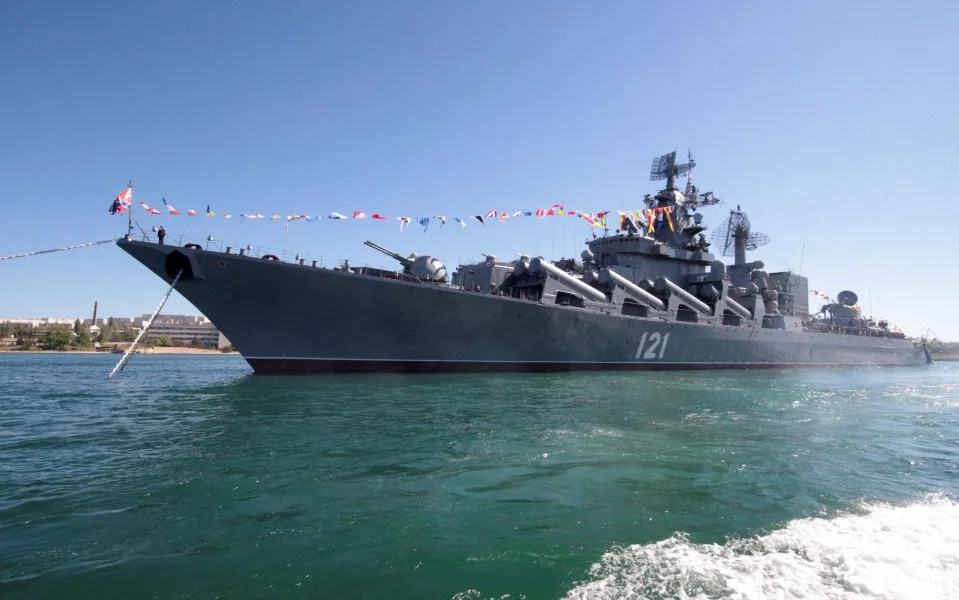Business Insider
Russian ships are heading south as the Russian Black Fleet flagship battles ‘extensive’ fire, officials say
Christopher Woody, Abbie Shull – April 14, 2022

Russian ships are heading south as the Russian Black Fleet flagship battles ‘extensive’ fire, officials say
- Russian Black Sea Fleet flagship Moskva is battling an “extensive” fire following an explosion aboard, officials say.
- Ukrainians forces claim to have hit the ship with missiles, but Western official could not confirm that on Thursday.
- While the details remain unclear, the incident is seen as a significant blow to the Russian navy.
Russian Navy ships in the northern Black Sea have moved south as the Russian Black Fleet flagship, the guided-missile cruiser Moskva, battles a severe fire, Western officials said Thursday.
Ukrainian forces claim to have struck the Russian cruiser with a long-range missile launched from shore. Western officials say there is not yet enough information to attribute the fire to a specific cause, but the damage to the Russian flagship appears extensive and amounts to a “significant blow” against Russia’s navy.
US officials believe Moskva “has experienced significant damage” and that the ship is still “battling a fire, but we do not know the extent of the damage,” what caused that damage, or whether there are casualties, a senior US defense official told reporters on Thursday, speaking anonymously to describe developing events in Ukraine.
Ukrainian officials say their forces struck the Russian warship with Neptune anti-ship missiles. One official said the Moskva was “drowned.” Russian state media said Thursday that the warship was afloat, its main armaments were intact, and the fire had been localized, implying it has been contained to some area but perhaps not extinguished.
Western officials have called Ukraine’s claims “credible” and said the Russian account of a fire breaking out aboard was “difficult to believe,” but the US official wouldn’t rule out an accident.

“The risk of fire is ever present and potential for explosions are also ever present, particularly on a surface combatant, which is designed in this case for air defense,” the US defense official said, pointing to the munitions and fuel that a ship like Moskva would be carrying.
This would be the first known use of the Ukrainian-developed Neptune missiles. The Neptune is capable of striking land and sea targets within a 200-mile range. It’s the first mid-range cruise missile produced by Ukraine and designed primarily to strike warships, like the Moskva.
The cruiser was between 60 and 65 nautical miles south of the port city of Odesa when it experienced an explosion. “Sixty miles is well within the Neptune’s effective range but it also could have been something else,” the US official said.
The US official called the fire “extensive” and “significant” but said it’s unclear if there is damage to the hull. The warship does appear to be sailing east, however. “Our assumption is that she’ll be heading to Sevastopol for repairs, but that’s really all we can say,” the US official said.
Roughly a half-dozen ships were “fairly dispersed” in the northern Black Sea at the time of the explosion, according to the US official, who said that four or five those ships, which were “as close or closer” to the coast as the Moskva, “have all moved south.”
“At this point, we hold them no closer than about 80 nautical miles from the coast, but ships move and I can’t predict where there’ll be an hour from now,” the US official added.
That movement has raised speculation that Russian commanders are trying to increase the distance between their ships and Ukrainian coastal defenses, which are being bolstered by weaponry provided by Western countries.
The Moskva is perhaps best known for involvement in the attack on Ukraine’s Snake Island at the start of the Russian invasion. When asked by the Russian fleet to surrender, Ukrainian guards on the island were heard saying “Russian warship, go f— yourself.” Speaking Thursday, however, the US official couldn’t confirm that Moskva had been involved in that incident.
Since then, Moskva has been active around Odesa. The Russians have repeatedly sent landing ships toward the port but diverted them at the last moment, tying up Ukrainian forces in the area with threats of an assault.
While the circumstances are unclear, the damage to Moskva is significant for Russia, which will be unable to reinforce its ships in the Black Sea following Turkey’s closure of the sea to warships at the outset of the conflict.
Alessio Patalano, an expert on naval warfare in East Asia at King’s College London, called it “one of the most severe naval losses since the Falklands War.”
“Tonight Russian commanders will feel less secure as they reflect upon the fact that the [Black Sea] is no longer their lake. It’s a box with no way out,” Patalano said. “Things have got much harder.”
